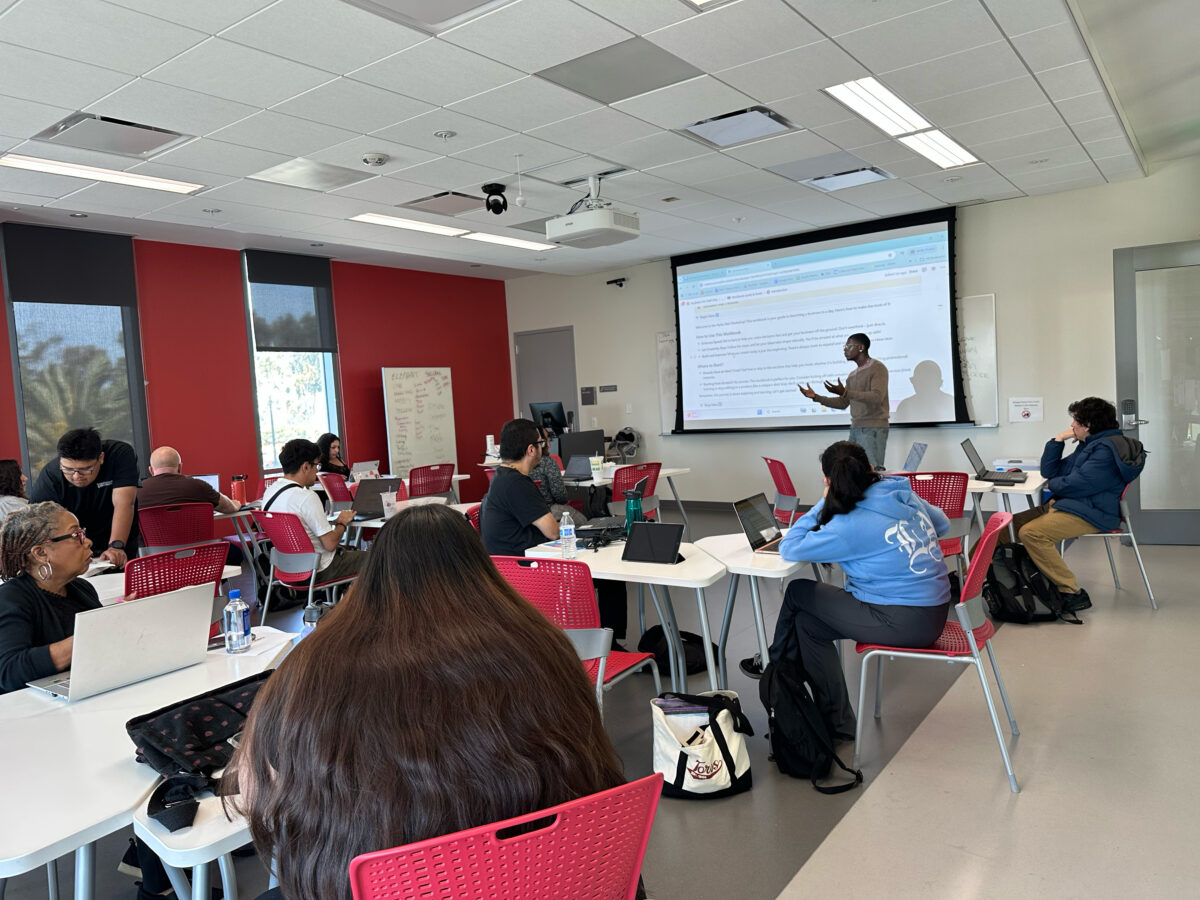Program aims to help students earn extra income and graduate debt-free.
By Sapphire Perez, Staff Reporter
Fourth-year business student Jose Ornelas remembers standing outside places like Target, Walmart, and the mall—just trying to drum up interest in his tutoring services. Back in 2019, he would spend most days handing out flyers for his business—rain or shine. Without financial aid to support his education at CSUDH and no interest in working under someone else, Ornelas knew he’d have to hustle if he wanted to pay his own way.
At the time, he charged $10 an hour for services like homework help, test prep, and college application support. Ornelas built a steady client base, especially as demand spiked during the COVID-19 pandemic. But if he wanted to earn more than just the cost of tuition, he would have to grow.
Ornelas reached out to the CSUDH Innovation Incubator, a campus hub for aspiring entrepreneurs in the South Bay—particularly Toros looking to build a business or graduate debt-free.
The Innovation Incubator launched at CSUDH in 2016. As the program gained traction, the university established a dedicated office in 2021—fittingly located in the Innovation and Instruction Building (I&I). The program is free and open to all CSUDH students, faculty, and staff.
At the helm is executive director David Ochi, an entrepreneur with more than 30 years of experience working with early-stage companies.
“The way we have really focused our effort is to say, ‘How do we look at entrepreneurship and innovation as a toolkit for changing a student’s life and the community around them?’” said Ochi, who began his own entrepreneurial journey at the age of 13, tutoring kids in his neighborhood.
The program has evolved to make entrepreneurship more accessible. What was once a 10-week, four-hour-per-week course is now a one-day bootcamp, streamlined with the help of AI tools to help participants get started quickly.
The first stage of the program, Alpha Start, equips students with a brand name, logo, business cards, and a basic website—all within just six hours. Mentors help shape business plans, while AI generates initial website and branding templates that students can customize to fit their goals.
After completing Alpha Start, students can advance to the Business Boost program, which focuses on marketing and management skills to help grow and sustain operations.
Ochi said the program isn’t about finding the next billion-dollar company—it’s about helping students earn extra income and graduate debt-free.
Cal State Dominguez Hills is among the most affordable universities in the state and the nation. U.S. News has ranked CSUDH No. 6 nationally for lowest median federal loan debt, with 2020–2021 graduates owing approximately $13,800.
Ochi estimates that if students earn at least $286 a month through their business over four years, they could graduate without debt. The program aims to help students make between $500 and $1,000 a month to cover school, living, and personal expenses.
The program is built around helping students recognize and monetize the skills they already have, Ochi added. Participants have launched businesses doing everything from making jewelry and selling flowers to dog walking and flipping shoes on eBay.
“There’s no shortage of little tiny things that a student could do that, again, on a grand scale might look like a small business, a tiny little nothing—but what’s wrong with that?” Ochi said.
Since some students may not be able to afford the basic supplies to launch a business, the Innovation Incubator partnered with the nonprofit Jewish Free Loan Association (JFLA) to offer interest-free loans of up to $2,500.
CSUDH contributed $25,000 to the fund, which JFLA matched—creating a $50,000 pool available exclusively to Toro entrepreneurs. As students repay their loans, the money is reinvested to support future participants.
Ornelas, the tutoring entrepreneur, now charges $30 an hour and spends up to 25 hours a week tutoring students from kindergarten through college. With support from the incubator, he’s working to grow his business to the point where he can hire other tutors. In the meantime, he’s developing a website and launching a podcast.
“If I want to attract and help as many kids as I can, I have to make it to a bigger scale,” Ornelas told The Bulletin.
Marketing student Johnnell Bragg always envisioned starting their own business. As a freshman walking through the I&I, he sought out opportunities to develop skills that could turn into a venture. Bragg eventually launched his own agency.
“[The start] was small—they only paid me, like, $20 a week, or like $20 a month,” Bragg recalled. “That kickstarted me from getting referrals, growing more business, and now, you know, the projects that I do are in the four-figure range.”

